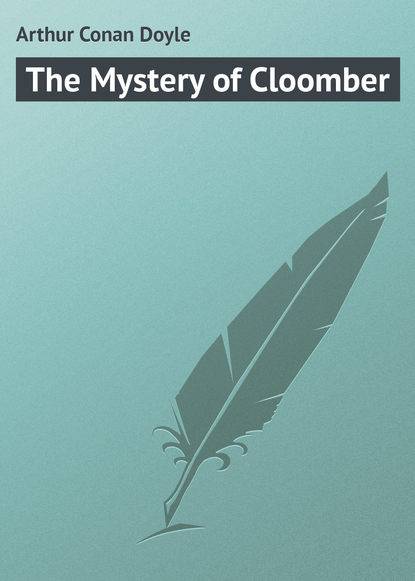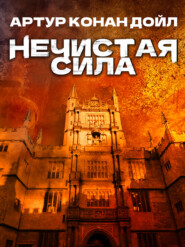По всем вопросам обращайтесь на: info@litportal.ru
(©) 2003-2025.
✖
The Mystery of Cloomber
Настройки чтения
Размер шрифта
Высота строк
Поля
The smaller of the two turned his face towards me as I spoke, and showed me that I was not mistaken in his identity, but his taller companion sprang back and showed every sign of violent agitation.
"What is this, McNeil?" I heard him say, in a gasping, choking voice. "Is this your promise? What is the meaning of it?"
"Don't be alarmed, General! Don't be alarmed!" said the little fat factor in a soothing fashion, as one might speak to a frightened child. "This is young Mr. Fothergill West, of Branksome, though what brings him up here tonight is more than I can understand. However, as you are to be neighbours, I can't do better than take the opportunity to introduce you to each other. Mr. West, this is General Heatherstone, who is about to take a lease of Cloomber Hall."
I held out my hand to the tall man, who look it in a hesitating, half-reluctant fashion.
"I came up," I explained, "because I saw your lights in the windows, and I bought that something might be wrong. I am very glad I did so, since it has given me the chance of making the general's acquaintance."
Whilst I was talking, I was conscious that the new tenant of Cloomber Hall was peering at me very closely through the darkness. As I concluded, he stretched out a long, tremulous arm, and turned the gig-lamp in such a way as to throw a flood of light upon my face.
"Good Heavens, McNeil!" he cried, in the same quivering voice as before, "the fellow's as brown as chocolate. He's not an Englishman. You're not an Englishman – you, sir?"
"I'm a Scotchman, born and bred," said I, with an inclination to laugh, which was only checked by my new acquaintance's obvious terror.
"A Scotchman, eh?" said he, with a sigh of relief. "It's all one nowadays. You must excuse me, Mr. – Mr. West. I'm nervous, infernally nervous. Come along, McNeil, we must be back in Wigtown in less than an hour. Good-night, gentlemen, good-night!"
The two clambered into their places; the factor cracked his whip, and the high dog-cart clattered away through the darkness, casting a brilliant tunnel of yellow light on either side of it, until the rumble of its wheels died away in the distance.
"What do you think of our new neighbour, Jamieson?" I asked, after a long silence.
"'Deed, Mr. West, he seems, as he says himsel', to be vera nervous. Maybe his conscience is oot o' order."
"His liver, more likely," said I. "He looks as if he had tried his constitution a bit. But it's blowing chill, Seth, my lad, and it's time both of us were indoors."
I bade my companion good-night, and struck off across the moors for the cheery, ruddy light which marked the parlour windows of Branksome.
III. Of our further acquaintance with major-general J. B. Heatherstone
There was, as may well be imagined, much stir amongst our small community at the news that the Hall was to be inhabited once more, and considerable speculation as to the new tenants, and their object in choosing this particular part of the country for their residence.
It speedily became apparent that, whatever their motives might be, they had definitely determined upon a lengthy stay, for relays of plumbers and of joiners came down from Wigtown, and there was hammering and repairing going on from morning till night.
It was surprising how quickly the signs of the wind and weather were effaced, until the great, square-set house was all as spick-and-span as though it had been erected yesterday. There were abundant signs that money was no consideration to General Heatherstone, and that it was not on the score of retrenchment that he had taken up his abode among us.
"It may be that he is devoted to study," suggested my father, as we discussed the question round the breakfast table. "Perhaps he has chosen this secluded spot to finish some magnum opus upon which he is engaged. If that is the case I should be happy to let him have the run of my library."
Esther and I laughed at the grandiloquent manner in which he spoke of the two potato-sacksful of books.
"It may be as you say," said I, "but the general did not strike me during our short interview as being a man who was likely to have any very pronounced literary tastes. If I might hazard a guess, I should say that he is here upon medical advice, in the hope that the complete quiet and fresh air may restore his shattered nervous system. If you had seen how he glared at me, and the twitching of his fingers, you would have thought it needed some restoring."
"I do wonder whether he has a wife and a family," said my sister. "Poor souls, how lonely they will be! Why, excepting ourselves, there is not a family that they could speak to for seven miles and more."
"General Heatherstone is a very distinguished soldier," remarked my father.
"Why, papa, however came you to know anything about him?"
"Ah, my dears," said my father, smiling at us over his coffee-cup, "you were laughing at my library just now, but you see it may be very useful at times." As he spoke he took a red-covered volume from a shelf and turned over the pages. "This is an Indian Army List of three years back," he explained, "and here is the very gentleman we want– 'Heatherstone, J. B., Commander of the Bath,' my dears, and 'V.C.', think of that, 'V.C.' – 'formerly colonel in the Indian Infantry, 41st Bengal Foot, but now retired with the rank of major-general.' In this other column is a record of his services – 'capture of Ghuznee and defence of Jellalabad, Sobraon 1848, Indian Mutiny and reduction of Oudh. Five times mentioned in dispatches.' I think, my dears, that we have cause to be proud of our new neighbour."
"It doesn't mention there whether he is married or not, I suppose?" asked Esther.
"No," said my father, wagging his white head with a keen appreciation of his own humour. "It doesn't include that under the heading of 'daring actions' – though it very well might, my dear, it very well might."
All our doubts, however, upon this head were very soon set at rest, for on the very day that the repairing and the furnishing had been completed I had occasion to ride into Wigtown, and I met upon the way a carriage which was bearing General Heatherstone and his family to their new home. An elderly lady, worn and sickly-looking, was by his side, and opposite him sat a young fellow about my own age and a girl who appeared to be a couple of years younger.
I raised my hat, and was about to pass them, when the general shouted to his coachman to pull up, and held out his hand to me. I could see now in the daylight that his face, although harsh and stern, was capable of assuming a not unkindly expression.
"How are you, Mr. Fothergill West?" he cried. "I must apologise to you if I was a little brusque the other night – you will excuse an old soldier who has spent the best part of his life in harness – All the same, you must confess that you are rather dark-skinned for a Scotchman."
"We have a Spanish strain in our blood," said I, wondering at his recurrence to the topic.
"That would, of course, account for it," he remarked. "My dear," to his wife, "allow me to introduce Mr. Fothergill West to you. This is my son and my daughter. We have come here in search of rest, Mr. West – complete rest."
"And you could not possibly have come to a better place," said I.
"Oh, you think so?" he answered. "I suppose it is very quiet indeed, and very lonely. You might walk through these country lanes at night, I dare say, and never meet a soul, eh?"
"Well, there are not many about after dark," I said.
"And you are not much troubled with vagrants or wandering beggars, eh? Not many tinkers or tramps or rascally gipsies – no vermin of that sort about?"
"I find it rather cold," said Mrs. Heatherstone, drawing her thick sealskin mantle tighter round her figure. "We are detaining Mr. West, too."
"So we are, my dear, so we are. Drive on, coachman. Good-day, Mr. West."
The carriage rattled away towards the Hall, and I trotted thoughtfully onwards to the little country metropolis.
As I passed up the High Street, Mr. McNeil ran out from his office and beckoned to me to stop.
"Our new tenants have gone out," he said. "They drove over this morning."
"I met them on the way," I answered.
As I looked down at the little factor, I could see that his face was flushed and that he bore every appearance of having had an extra glass.
"Give me a real gentleman to do business with," he said, with a burst of laughter. "They understand me and I understand them. 'What shall I fill it up for?' says the general, taking a blank cheque out o' his pouch and laying it on the table. 'Two hundred,' says I, leaving a bit o' a margin for my own time and trouble."
"I thought that the landlord had paid you for that," I remarked.
"Aye, aye, but it's well to have a bit margin. He filled it up and threw it over to me as if it had been an auld postage stamp. That's the way business should be done between honest men – though it wouldna do if one was inclined to take an advantage. Will ye not come in, Mr. West, and have a taste of my whisky?"
"No, thank you" said I, "I have business to do."
"Well, well, business is the chief thing. It's well not to drink in the morning, too. For my own part, except a drop before breakfast to give me an appetite, and maybe a glass, or even twa, afterwards to promote digestion, I never touch spirits before noon. What d'ye think o' the general, Mr. West?"
"Why, I have hardly had an opportunity of judging," I answered.
Mr. McNeil tapped his forehead with his forefinger.

















